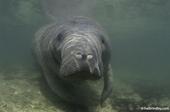Please visit the Save the Manatee Club (SMC) at www.savethemanatee.org to find out more on how you can help these animals. The SMC helps by providing funds for research, rescue, and awareness.
MANATEE FACTSDESCRIPTION: West Indian manatees are large, gray aquatic mammals with bodies that taper to a flat, paddle-shaped tail. They have two forelimbs, called flippers, with three to four nails on each flipper. Their head and face are wrinkled with whiskers on the snout. The manatee's closest relatives are the elephant and the hyrax (a small, gopher-sized mammal). Manatees are believed to have evolved from a wading, plant-eating animal. The West Indian manatee is related to the West African manatee, the Amazonian manatee, the dugong, and Steller's sea cow, which was hunted to extinction in 1768. The average adult manatee is about 10 feet long and weighs between 800 and 1,200 pounds.
HABITAT AND RANGE: Manatees can be found in shallow, slow-moving rivers, estuaries, saltwater bays, canals, and coastal areas – particularly where seagrass beds or freshwater vegetation flourish. Manatees are a migratory species. Within the United States, they are concentrated in Florida in the winter. In summer months, they can be found as far west as Texas and as far north as Virginia, but these sightings are rare. Summer sightings in Alabama, Georgia and South Carolina are quite common. West Indian manatees can also be found in the coastal and inland waterways of Central America and along the northern coast of South America, although distribution in these areas may be spotty.BEHAVIOR: Manatees are gentle and slow-moving animals. Most of their time is spent eating, resting, and in travel. Manatees are completely herbivorous. They eat a large variety of submerged, emergent and floating plants and can consume 10-15% of their body weight daily in vegetation. Because they are mammals, they must surface to breathe air. They may rest submerged at the bottom or just below the surface of the water, coming up to breathe on an average of every three to five minutes. When manatees are using a great deal of energy, they may surface to breathe as often as every 30 seconds. When resting, manatees have been known to stay submerged for up to 20 minutes. Manatees can swim up to 20 miles per hour in short bursts, but they usually only swim about three to five miles per hour.
LIFESPAN, MORTALITY, and POPULATION: West Indian manatees have no natural enemies, and it is believed they can live 60 years or more. As with all wild animal populations, a certain percentage of manatee mortalities is attributed to natural causes of death such as cold stress, gastrointestinal disease, pneumonia and other diseases. A high number of additional mortalities are from human-related causes. Most human-related manatee mortalities occur from collisions with watercraft. Other causes of human-related manatee mortalities include being crushed and/or drowned in canal locks and flood control structures; ingestion of fish hooks, litter and monofilament line; and entanglement in crab trap lines. Ultimately, loss of habitat is the most serious threat facing manatees today. There are approximately 3,000 West Indian manatees left in the United States.BREEDING and REPRODUCTION: The reproductive rate for manatees is slow. Female manatees are not sexually mature until they are five years of age, and males are mature at approximately seven years of age. It is believed that one calf is born every two to five years, and twins are rare. The gestation period is about a year. Mothers nurse their young for one to two years, so a calf may remain dependent on its mother during that time.
West Indian manatees in the United States are protected under federal law by the Marine Mammal Protection Act of 1972, and the Endangered Species Act of 1973, which make it illegal to harass, hunt, capture, or kill any marine mammal. West Indian manatees are also protected by the Florida Manatee Sanctuary Act of 1978 which states: "It is unlawful for any person, at any time, intentionally or negligently, to annoy, molest, harass, or disturb any manatee." Anyone convicted of violating Florida's state law faces a possible maximum fine of $500 and/or imprisonment for up to 60 days. Conviction on the federal level is punishable by a fine of up to $100,000 and/or one year in prison. The Manatee Recovery Plan was developed as a result of the Endangered Species Act. The recovery plan is coordinated by the U.S. Fish & Wildlife Service (USFWS) and sets forth a list of tasks geared toward recovering manatees from their current endangered status. In October of 1989, Florida's Governor and Cabinet directed the Florida Department of Environmental Protection to work with 13 "key" manatee counties in Florida to reduce injuries and deaths. These 13 counties include: Duval, Volusia, Brevard, Indian River, St. Lucie, Martin, Palm Beach, Broward, Dade, Collier, Lee, Sarasota, and Citrus. Over 80% of manatee mortalities have occurred in these counties. The first task of these 13 county governments, working with the state, is to develop site-specific boat speed zones to reduce watercraft collisions. The second task is to develop comprehensive manatee protection plans (MPP) at the local level. Legal Protection: Conservation: Other conservation measures deemed important to saving manatees include: research covering the biology, mortality, population and distribution, behavior, and habitat of manatees; implementation of management plans; posting of regulatory speed signs and levying of fines for excess speeds in designated areas; manatee education and public awareness programs; and public acquisition of critical habitat and creation of sanctuaries.Call 1-888-404-FWCC (3922), #FWC or *FWC on your cellular phone, or use VHF Channel 16 on your marine radio if you see an injured, dead, tagged, or orphaned manatee, or if you see a manatee being harassed.
Kingdom: AnimaliaOrder: Sirenia
Species: manatus
Phylum: Chordata
Family: Trichechidae
Subspecies: manatus
Class: Mammalia
Genus: Trichechus latirostris
500 N. Maitland Ave. Maitland, FL 32751
www.savethemanatee.org
1-800-432-JOIN (5646)
